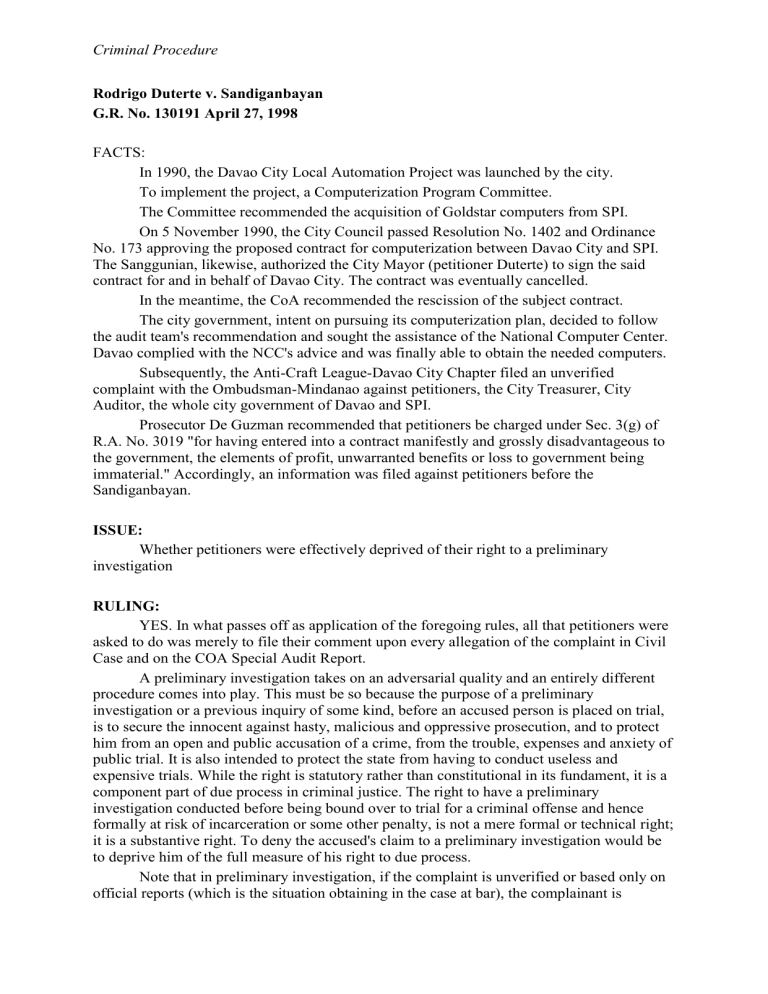
Criminal Procedure Rodrigo Duterte v. Sandiganbayan G.R. No. 130191 April 27, 1998 FACTS: In 1990, the Davao City Local Automation Project was launched by the city. To implement the project, a Computerization Program Committee. The Committee recommended the acquisition of Goldstar computers from SPI. On 5 November 1990, the City Council passed Resolution No. 1402 and Ordinance No. 173 approving the proposed contract for computerization between Davao City and SPI. The Sanggunian, likewise, authorized the City Mayor (petitioner Duterte) to sign the said contract for and in behalf of Davao City. The contract was eventually cancelled. In the meantime, the CoA recommended the rescission of the subject contract. The city government, intent on pursuing its computerization plan, decided to follow the audit team's recommendation and sought the assistance of the National Computer Center. Davao complied with the NCC's advice and was finally able to obtain the needed computers. Subsequently, the Anti-Craft League-Davao City Chapter filed an unverified complaint with the Ombudsman-Mindanao against petitioners, the City Treasurer, City Auditor, the whole city government of Davao and SPI. Prosecutor De Guzman recommended that petitioners be charged under Sec. 3(g) of R.A. No. 3019 "for having entered into a contract manifestly and grossly disadvantageous to the government, the elements of profit, unwarranted benefits or loss to government being immaterial." Accordingly, an information was filed against petitioners before the Sandiganbayan. ISSUE: Whether petitioners were effectively deprived of their right to a preliminary investigation RULING: YES. In what passes off as application of the foregoing rules, all that petitioners were asked to do was merely to file their comment upon every allegation of the complaint in Civil Case and on the COA Special Audit Report. A preliminary investigation takes on an adversarial quality and an entirely different procedure comes into play. This must be so because the purpose of a preliminary investigation or a previous inquiry of some kind, before an accused person is placed on trial, is to secure the innocent against hasty, malicious and oppressive prosecution, and to protect him from an open and public accusation of a crime, from the trouble, expenses and anxiety of public trial. It is also intended to protect the state from having to conduct useless and expensive trials. While the right is statutory rather than constitutional in its fundament, it is a component part of due process in criminal justice. The right to have a preliminary investigation conducted before being bound over to trial for a criminal offense and hence formally at risk of incarceration or some other penalty, is not a mere formal or technical right; it is a substantive right. To deny the accused's claim to a preliminary investigation would be to deprive him of the full measure of his right to due process. Note that in preliminary investigation, if the complaint is unverified or based only on official reports (which is the situation obtaining in the case at bar), the complainant is Criminal Procedure required to submit affidavits to substantiate the complaint. The investigating officer, thereafter, shall issue an order, to which copies of the complaint-affidavit are attached, requiring the respondent to submit his counter-affidavits. In the preliminary investigation, what the respondent is required to file is a counter-affidavit, not a comment. It is only when the respondent fails to file a counter-affidavit may the investigating officer consider the respondent's comment as the answer to the complaint. Against the foregoing backdrop, there was a palpable non-observance by the Office of the Ombudsman of the fundamental requirements of preliminary investigation.

